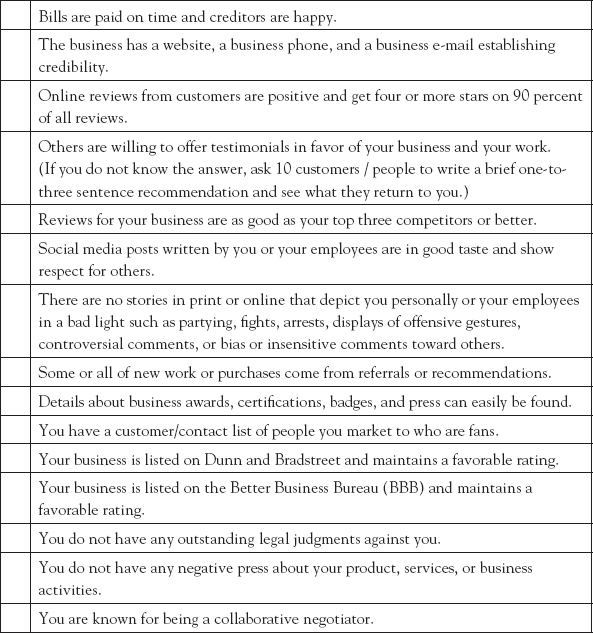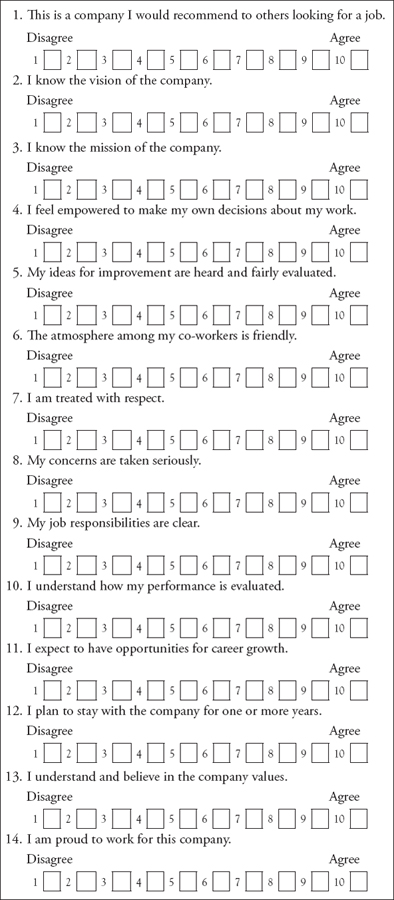Genius gives birth, talent delivers.
—Jack Kerouac
Before your customers can buy your products or services, they must know that your company exists. You must teach them in person, on paper, or online who your company is and why they should care about it. Before you do, you must understand yourself.
Start by answering these questions:
• What do you have to offer?
• Why you are unique?
• Does what you have to offer meets their needs?
• Is your business trustworthy?
The first three questions tend to be easier to answer than the last. These factors impact the answer:
• History
• Reputation
• Culture
History
Every business has a story. It begins with the inspiration and ends with wherever you are today. In-between, the beginning and today is the story of how you got here. Financing or investment may hinge on how well you tell the story of your history both verbally and in writing. Write out a brief history. Create a compelling and inspiring story by answering these questions.
• How did the idea to start this business come to you?
• What is your experience and what skills did you have that prepared you for this journey?
• What inspires you to keep going?
• How have your team members impacted your journey with their expertise and skills?
Paragraph Two
• What three key important things have happened on your journey as a business owner?
Paragraph Three
• Where did, or where will, you get the funds from to start the business?
• How many people do you employ including contractors and temporary workers?
• How much have you and any partners invested in the business?
Existing Business Only
• What was your beginning revenue and what is your revenue today?
Reputation
Your business reputation is a key factor in your creditability. Your own reputation matters as well. You are not as insulated from your business as leaders of corporations often are. You and your team represent your business wherever you are and whatever you are doing or saying in public. This includes on social media.
Cultivate a good reputation by:
• Treating your customers well
• Negotiating fairly
• Meeting deadlines
• Upholding your end of contracts
• Being professional
• Remembering you are always a representative of your company on and off the clock
Complete the following Reputation Checklist (Figure 2.1) to begin to understand your business reputation. If are a startup or are considering a startup, answer the questions from the perspective of your personal reputation. Put a check in each box if you agree with the statement. Put an X in those boxes where you do not agree with the statement.
Reputation Checklist

Figure 2.1 Reputation Checklist
Review your answers and work quickly to correct any issues that you see.
Reforming Your Reputation
Reputations can be damaged for a number of reasons. Many entrepreneurs start businesses as a way out of bad circumstances and so must deal with reputation issues immediately. Unemployment, inferior credit, or poor reputation sometimes makes creating your own job the best next step. Other entrepreneurs get into trouble along the way while learning the art of running a business.
If your reputation review indicated that yours could use a tune up, start now. Your new reputation begins today. Help is available for these common issues:
• Financial trouble
• Bad online reviews
• Disruptions in service
• Poor delivery
• Legal issues
• Tough negotiations
Financial Trouble
Financial issues often plague small businesses at some point. The SBA, Small Business Development Council (SBDC), Minority Supplier Development Council (MSDC), and a host of other state and local organizations exist to assist motivated individuals wanting a better life for themselves through business ownership. They can help you sort out financial issues. Colleges often provide support as well through free programs designed to give their accounting students real experience. Some accelerators such as Business Owner’s MBA (BOMBA) focus on teaching business owners best financial business practices. Seek out advice and get support.
Poor reviews hurt companies that provide services as well as those who offer products. If your company has a BBB or Dunn and Bradstreet (D and B) rating that is poor, work to resolve the issues or differences with your customers who are unhappy as quickly as possible. If you have a bad online review, address it immediately by apologizing even if you are not wrong. Reply to your customer that you are sorry because they are unhappy without admitting any guilt. Respond with kind words. Never argue. Offer a solution if possible so that potential customers see that you care.
Disruptions in Service
Disruptions can be caused by a number of factors, some of which may be out of your control. Things happen as we saw throughout 2020 and 2021. Extreme weather and a global supply chain broken first by tariff battles and then by the Covid-19 pandemic caused challenges. Customers may not be happy but most often they understand when things happen you cannot control.
As soon as you know about a problem, inform everyone about to be impacted. Be honest with your customers about what happened and why. Let those impacted know what you have done to correct the situation.
Poor Delivery
This is different from disruptions in service. These issues are caused by internal problems that should have been prevented. Poor delivery has to do with incidents where your products or services were not delivered or when the quality of your goods or services was not as good as your customer deserved. Make amends when possible by refunding money or redoing work at your own cost. The sooner you rectify the situation the better. Take a hard look at what went wrong and make changes so it does not happen again.
Lawsuits, even frivolous lawsuits, often make your customers uneasy. Investors and bankers are likely to shy away from your business as long as a judgment is pending. If you can resolve the matter before a court case is filed, you are much better off. If you cannot then work with a good lawyer to resolve pending litigation as quickly as possible. Take care to be fair.
Tough Negotiations
Tough negotiators may be admired by some but studies show that a reputation for being a tough negotiator may hurt you in the marketplace. Catherine Tinsley PhD, executive director of Georgetown McDonough’s Executive Master’s in Leadership program, studied gender-based negotiation tactics. She discovered that those who had a reputation for being collaborative, faired better in negotiations than those with a reputation for being tough, or whose reputation was unknown. When women were seen as tough negotiators, they experienced more backlash than men did. This was true even if the reputation was not based on any real facts. (Tinsley PhD 2012)
Angie Strader, former military negotiator and small business owner, had this to say, “I do not tell people I was a military-trained hostage negotiator because it puts people on the defensive. They immediately think I have an unfair advantage. Experience has taught me that to succeed in a negotiation, you have to gain people’s trust by showing that you honestly and sincerely care about both sides reaching a mutually beneficial agreement.
This does not mean that you have to give in to the other side’s demands; it means that both sides can get to a point where they can walk away feeling like they won, or at the very least, that they didn’t lose. It takes patience and compassion to bring a peaceful end to a tense situation. In a successful negotiation, everyone gets out safely, feels like they won, and is willing to come back to the table another day.” (Strader 2021)
Your company culture defines your business environment. Executives who participated in the 2021 Deloitte Global Human Capital Trends survey reported that building an organization that celebrates culture, celebrates growth, is adaptable, and shows resilience was ranked as most important in building capacity through workforce transformation. Similarly, workers who participated in the study ranked “improving worker well-being” as third in their concerns. (Deloitte Global Human Capital 2021)
Your culture may be the most important driver of workforce contentment. Happy resources tend to do better work. Studies show that workers who like their jobs perform better. Economists Andrew Oswald PhD, Eugenio Proto PhD, and Daniel Sgroi PhD from the department of economics at the University of Warwick tested the idea that happy employees work harder in three different experiments. They discovered, “The treated[tested] individuals have approximately 12 percent greater productivity.” (Oswald, Proto, and Sgroi 2015)
It is clear to see that company culture is important to your success. Even if you have no employees yet, answer the questions for yourself considering whether you agree or disagree with how important each statement would likely be to your future.
Culture Quiz
On a scale of 1 to 10, determine how much you agree with the statement with 1 being Disagree Strongly and 10 being Agree Strongly (see the Culture Quiz in Figure 2.2). Select the box to the right of the number that best represents what you believe to be true. Your answers will be anonymous. Please answer truthfully.

